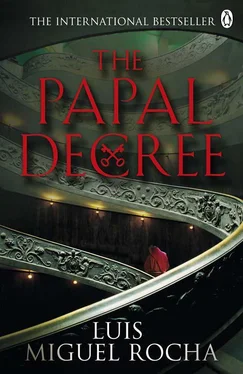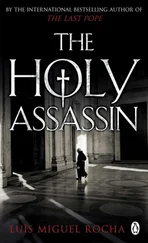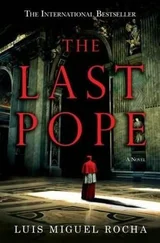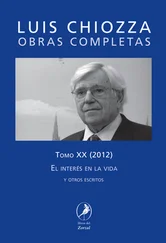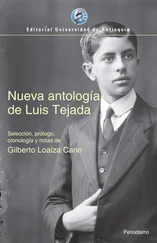Luis Rocha - Papal decree
Здесь есть возможность читать онлайн «Luis Rocha - Papal decree» весь текст электронной книги совершенно бесплатно (целиком полную версию без сокращений). В некоторых случаях можно слушать аудио, скачать через торрент в формате fb2 и присутствует краткое содержание. Жанр: Триллер, на английском языке. Описание произведения, (предисловие) а так же отзывы посетителей доступны на портале библиотеки ЛибКат.
- Название:Papal decree
- Автор:
- Жанр:
- Год:неизвестен
- ISBN:нет данных
- Рейтинг книги:4 / 5. Голосов: 1
-
Избранное:Добавить в избранное
- Отзывы:
-
Ваша оценка:
- 80
- 1
- 2
- 3
- 4
- 5
Papal decree: краткое содержание, описание и аннотация
Предлагаем к чтению аннотацию, описание, краткое содержание или предисловие (зависит от того, что написал сам автор книги «Papal decree»). Если вы не нашли необходимую информацию о книге — напишите в комментариях, мы постараемся отыскать её.
Papal decree — читать онлайн бесплатно полную книгу (весь текст) целиком
Ниже представлен текст книги, разбитый по страницам. Система сохранения места последней прочитанной страницы, позволяет с удобством читать онлайн бесплатно книгу «Papal decree», без необходимости каждый раз заново искать на чём Вы остановились. Поставьте закладку, и сможете в любой момент перейти на страницу, на которой закончили чтение.
Интервал:
Закладка:
Gunter appeared to be in his forties and in great shape, emanating energy through every pore.
‘To what do I owe this visit at such an inopportune hour for the servants of God?’ Gunter asked.
‘I’m sorry for the late call, Father Gunter, but servants have been assassinated and others need your help,’ Gavache said in his nasal tone, not caring if he seemed sarcastic. Gavache was Gavache. Who could blame him?
‘I’m not sure I understand.’
‘We need your help, Gunter. Show him the recording, Inspector,’ Rafael said. It would be easier if Gunter was informed about what has happened as quickly as possible. Tell him everything, or almost everything, and show him the recording. Gunter remained pensive. A phrase went though his mind. Ad maiorem Dei gloriam. Saint Ignatius uttered these same words in the sixteenth century, in the same city of Montmartre, where he founded the Society of Jesus with Peter Faber, Francis Xavier, Alfonso Salmeron, Diego Laynez, Nicholas Bobadilla, and Simao Rodrigues, on August 15, 1534. It was one of the rules that governed the Society. For the greater glory of God. For Loyola this was the most important thing. Gunter listened and watched everything in silence and then went on thinking.
‘Did you know the archaeologist or theologian?’ Gavache proceeded. He needed to start putting the pieces of the puzzle together.
‘I don’t believe so.’
‘Jean-Paul, show the photos of the victims to the father,’ the inspector ordered.
Jean-Paul did so promptly, handing over the photos he was carrying. Gunter carefully examined the faces but not one was familiar.
‘I don’t recognize anyone. Sorry, Inspector.’
‘Do you think it could be the work of a Jesuit father?’ Gavache continued.
‘It doesn’t seem believable to me that priests, Jesuits or not, would go around killing people. We preach love, the way of God, the good. Having said that, anything is possible.’
‘Let us suppose that these guys’ — Gavache pointed at the photos of Yaman Zafer and Sigfried Hammal — ‘were enemies of the church. The reason doesn’t matter. Imagine they knew a secret that could bring down the church. Would you be the people to get to resolve the problem?’
Gunter chuckled, ‘For the love of God, Inspector. The church doesn’t do these things, much less the Jesuits.’
‘Bullshit,’ Jacopo stammered.
Gunter didn’t respond.
‘We’re not going to get anything here, Jean-Paul,’ Gavache muttered, turning his back on the conversation.
‘Well, no, Inspector.’
‘Paris has nothing, Marseille nothing. We have nothing.’ Gavache was thinking out loud. ‘Where are we going to start over, Jean-Paul?’
‘At the beginning, Inspector. Always at the beginning.’
Rafael took advantage of the moment to get close to Gunter so that no one would hear them. ‘Do you have something for me? You can fool the inspector, but I know it was a Jesuit priest. I want to know who it was and who gave the order.’
‘Are you crazy?’ Gunter whispered. ‘Bringing a cop with you. Where’s your common sense?’
‘My common sense ended when Zafer died at the hands of a Jesuit priest,’ Rafael replied coldly.
‘I can’t help you, Rafael.’
‘This Loyola,’ Gavache mentioned with a quizzical expression.
‘Who?’ Gunter and Rafael answered simultaneously.
‘The Loyola the historian was talking about.’
‘Saint Ignatius,’ Jacopo explained.
‘What about him?’
‘What was he all about?’
Rafael and Gunter looked at each other.
‘I don’t understand what you’re asking.’ Gunter was confused.
‘What was he doing? Why did he found the Society of Jesus? What was the purpose? Do you have to take some special course to join the society? Is it enough to know someone? No one does anything for free, right, Jean-Paul?’
‘Nobody, Inspector.’
‘What was his deal?’ Gavache insisted.
Gunter didn’t know how to answer. It was a very strange question.
‘Saint Ignatius was a Spaniard and — ’ Jacopo was ready to give another history lesson.
‘Please, Mr. Jacopo,’ Gavache interrupted, lighting a cigarette and exhaling smoke into the holy air of the church. ‘We have a Jesuit here. I’d prefer some inside information, if you don’t mind.’
According to Father Gunter, Ignatius Loyola was born in 1491 in the town of Loyola, near San Sebastian, in Basque country. He became a soldier and was seriously wounded in the Battle of Pamplona, which occurred during the Italian War when Francis the First of France and Charles the Fifth of Spain were fighting over the Holy Roman Empire. This was in 1521. Loyola spent months recovering and began to read books about Jesus, saints, the road to God. These readings influenced him greatly.
‘Books have always been a bad influence,’ Gavache added, sending a cloud of smoke into the air.
When Loyola recovered his health, he secretly left his father’s house and dedicated his life to God. First in the Monastery of Montserrat, where he confessed over the course of three days. Then he abandoned his elegant clothes and decided to live a life of poverty in the monastery of Manresa. He wasn’t a monk; he only occupied one of the cells as a guest. He supported himself by begging and not eating meat or drinking wine, and visited the hospital, and brought food to those who suffered. He underwent tests of his soul, visions, and spiritual experiences. In 1523 he decided to ask permission from the pope to go to the Holy Land to convert the infidels. He obtained a pontifical passport and, once in Venice, headed for Jerusalem. He planned to live there, but the Franciscans would not permit it, so he returned to Europe, to Barcelona.
‘When was that?’ Gavache asked.
‘In 1524.’
‘How could someone so resolute, who asks for a passport from the pope and wants to live in the Holy Land, be convinced to return so quickly?’
‘What do you mean by that?’
‘What I said. Deciding to live his life someplace and only staying a few months, simply because somebody didn’t want him there…’ He let the question hang over them. ‘Not a good story.’
‘That’s your opinion.’
‘Why didn’t the Franciscans want him there?’
‘We don’t know.’
‘Well, then.’
‘He entered the University of Alcala de Henares on the outskirts of Madrid, founded by Cardinal Cisneros in the sixteenth century and known today as the Complutense of Madrid. He studied Latin, but his preaching and begging brought him to the attention of the Holy Inquisition.’
Gavache smiled at the mention of the Holy Inquisition.
‘He was a prisoner for a month and a half, but they found nothing bad in his writings or what he preached. They freed him, but he was forbidden to preach and had to dress better. He appealed to the archbishop of Toledo, who upheld the prohibition, but let him enroll in the University of Salamanca. Again, he was arrested by the Inquisition. He decided to leave for Paris, where he entered the university in 1528. He studied theology and literature, becoming a teacher in 1533. In 1534 he founded the society with six followers. The intention was to go to Jerusalem, but first he needed the permission of the pope. Paul the Third approved his voyage and consented to ordain them priests. The war that broke out between the Papal States, Venice, and the Turks delayed the journey to the Holy Land, so Ignatius remained in Rome. Paul the Third, who needed missionaries for the Americas and the Orient, verbally approved the new order on September 3, 1539, and a year later confirmed it with the papal Regimini militantis Ecclesiae, which contained the statutes of the Society of Jesus. Thus it was officially born.’
Читать дальшеИнтервал:
Закладка:
Похожие книги на «Papal decree»
Представляем Вашему вниманию похожие книги на «Papal decree» списком для выбора. Мы отобрали схожую по названию и смыслу литературу в надежде предоставить читателям больше вариантов отыскать новые, интересные, ещё непрочитанные произведения.
Обсуждение, отзывы о книге «Papal decree» и просто собственные мнения читателей. Оставьте ваши комментарии, напишите, что Вы думаете о произведении, его смысле или главных героях. Укажите что конкретно понравилось, а что нет, и почему Вы так считаете.
